Tom Cotton Demands Joe Biden Explain Why He Eliminated U.S. Tariffs on China
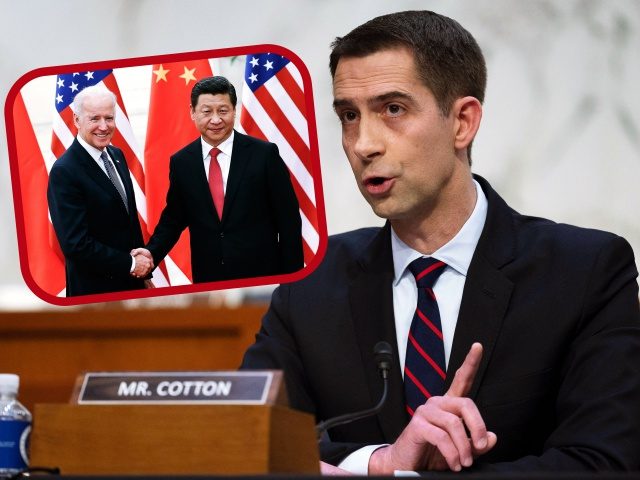
Sen. Tom Cotton (R-AR) is demanding President Joe Biden’s administration officials explain their decision to eliminate United States tariffs on hundreds of China-made products.
As Breitbart News reported last month, Biden’s United States Trade Representative (USTR) Katherine Tai announced the elimination of Section 301 tariffs on more than 350 products made in China that are imported to the U.S. market.
The China-made products that will escape U.S. tariffs thanks to Biden include breast pumps, solar water heaters, garage door openers, X-ray tables, and thermostats, as well as food products from China such as crab meat, Dungeness crab, and Alaskan sole.
In a letter to Tai, Cotton called the dropping of U.S. tariffs on China “economic appeasement” and demanded the administration answer questions as to the decision-making behind the move. Cotton wrote:
Days ago, your agency blew a massive hole in our enforcement regime by approving tariff exemptions for over 350 Chinese-made products. Earlier last month, USTR also punted on opening new 301 investigations into China’s economic abuses. These trade concessions are a gift to Chinese producers that continue your agency’s pattern of economic appeasement.”
Cotton wants to know how many of the China-made products exempted from U.S. tariffs can be readily made in America or in a foreign country that is, at least, an ally of the U.S. government.
Cotton also asked:
In estimated total dollar value, how much will trade with China likely increase as a result of these tariff exemptions? Will our trade deficit likely grow or shrink? [Emphasis added]
Did we receive any reciprocal tariff reductions or other trade concessions from China in response to these exemptions? [Emphasis added]
Last December, Cotton marked the 20th anniversary of China’s joining the World Trade Organization (WTO), a decision supported by both political establishments at the time.
“Millions of Americans lost good-paying, blue-collar jobs to the ‘China trade shock’ in the years that followed,” Cotton said. “Countless small towns, main streets, and working class neighborhoods were gutted and boarded up.”
From 2001 to 2018, U.S. free trade with China has eliminated 3.7 million American jobs from the economy — 2.8 million of which were lost in American manufacturing. During that same period, at least 50,000 American manufacturing plants closed down.
Those massive job losses have coincided with a booming U.S.-China trade deficit. In 1985, before China entered the WTO, the U.S. trade deficit with China totaled $6 billion. In 2019, the U.S. trade deficit with China totaled more than $345 billion.
Meanwhile, a study from 2019 found that permanent U.S. tariffs of 25 percent on all Chinese imports would create more than a million American jobs in five years. American manufacturing is vital to the U.S. economy, as every one manufacturing job supports an additional 7.4 American jobs in other industries.
Exclusive—Peter Schweizer: How U.S. Commerce Department Officials Cashed In on China
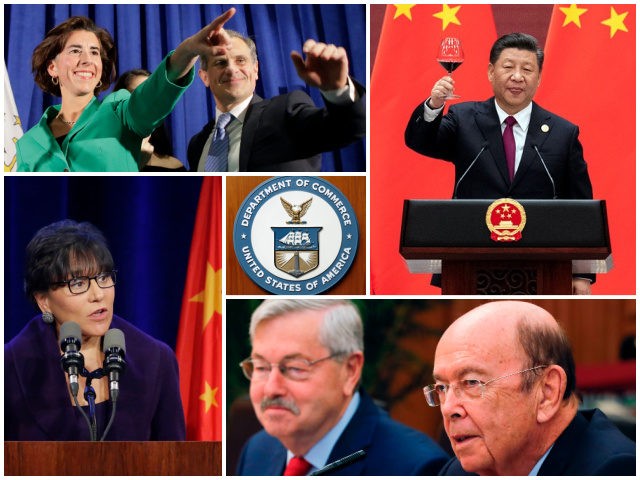
Republicans and Democrats in Washington don’t agree on much these days. Except, it seems, when it comes to leveraging your position as secretary of an overlooked federal agency for personal enrichment.
A new report by the Government Accountability Institute (GAI), entitled “Department of Cronyism: Inside Deals, Conflicts of Interest and Chinese Connections,” exposes the vast opportunities for cronyism and corruption within the U.S. Department of Commerce and the people who have taken advantage of it.
The report documented the existence of ties to China with President Joe Biden’s choice for commerce secretary, Gina Raimondo.
Raimondo, the former governor of Rhode Island, has a background in finance, having founded the venture capital firm Point Judith Capital in 2000. She is worth roughly $1.8 billion, based on her financial disclosure and as reported by Forbes. Raimondo’s husband, Andrew Moffit, worked for 20 years at the mega-consulting firm McKinsey & Co., but he left McKinsey in 2020 to became the “Chief People Officer” for a software company called PathAI that applies artificial intelligence and machine learning to medical diagnostics.
In February of this year, Moffit exercised his PathAI stock options and left his full-time job with the company. Instead, he became its “strategic adviser,” thus deepening his financial ties to the firm while creating the appearance of distance between his role with the company and his wife’s duties as Commerce secretary.
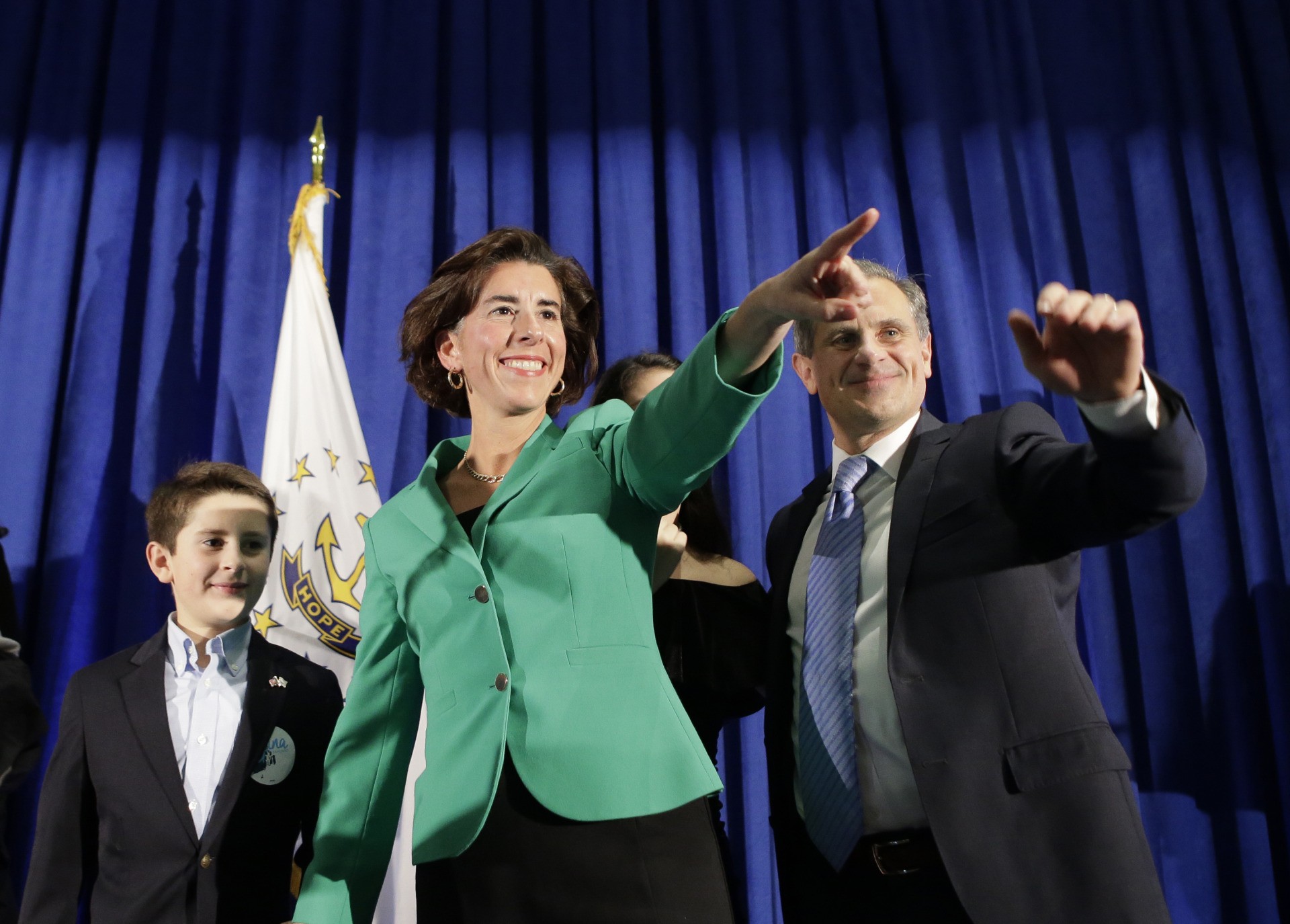
Rhode Island Governor Democrat Gina Raimondo, center, and her husband Andrew Moffit, right, celebrate her election victory on November 6, 2018, in Providence, Rhode Island. (AP Photo/Steven Senne)
Artificial intelligence is the focus of the Commerce Department’s Bureau of Industry and Security because it often has direct military applications, making it sensitive to U.S. national security. Possible restrictions include the sharing of AI technology with foreign employees, an area in which Moffit could well be responsible as “Chief People Officer.”
In 2019, U.S.-based venture capital firm Danhua Capital Management (doing business as DHVC) participated in a $60 million fundraising round for PathAI. DHVC not only has holdings in sensitive technology sectors, but also has ties to a Chinese state-owned entity. Therefore, DHVC’s relationship with PathAI could raise conflict-of-interest and/or national security concerns,” according to GAI’s report.
Raimondo’s predecessor during the Trump administration was Wilbur Ross. Ross was a successful businessman with huge commercial ties to China. He had shipping companies that had major Chinese investment. In fact, Trump criticized him for being too soft on China while Ross ran the department.
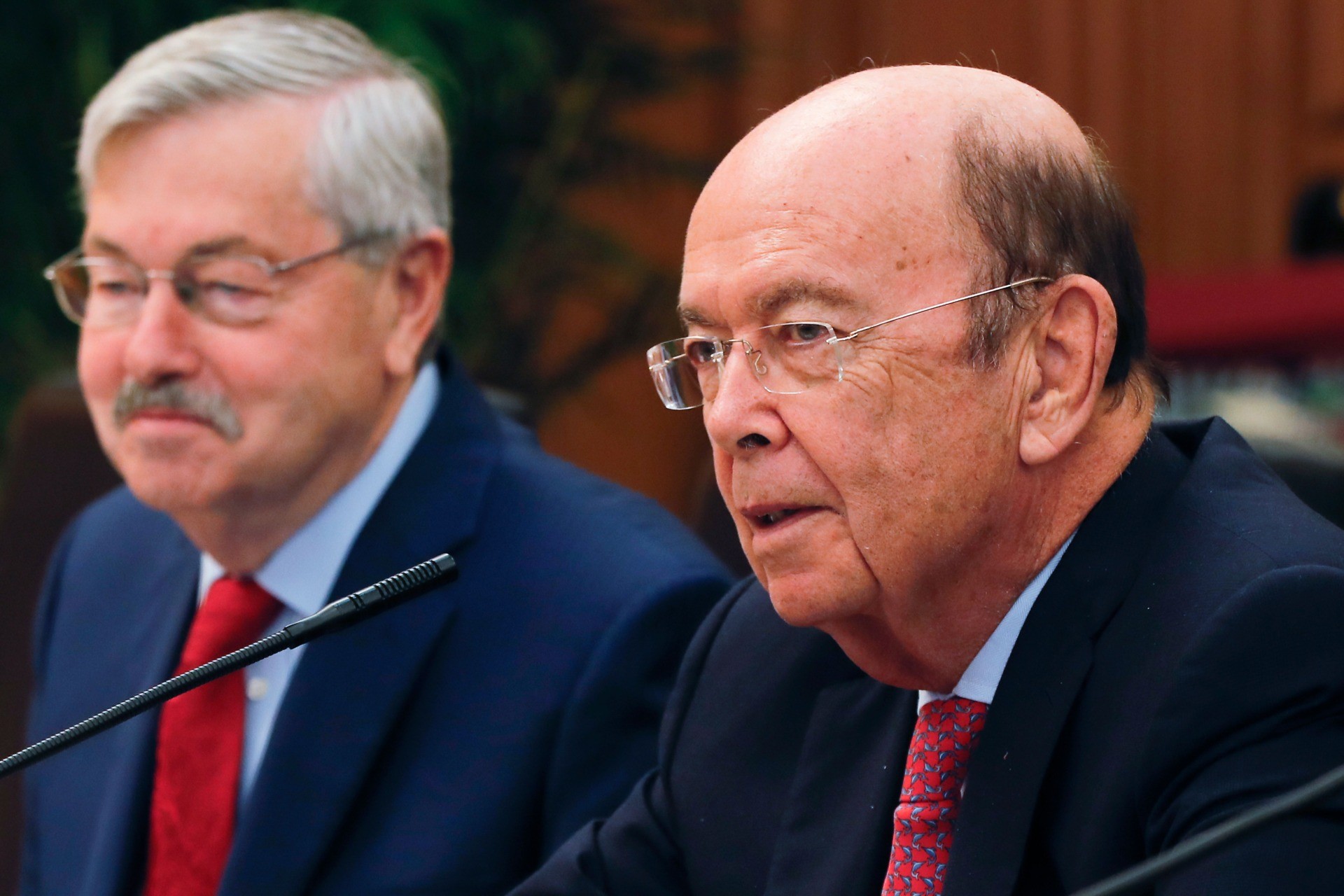
U.S. Commerce Secretary Wilbur Ross (right) speaks next to U.S. Ambassador to China Terry Branstad (left) during a bilateral meeting in Beijing on September 25, 2017. (ANDY WONG/AFP via Getty Images)
Donald Trump’s ambassador to China was former Iowa governor Terry Branstad. The connections of Branstad’s sons really show the systemic levels of influence China has built up in Washington. His son, Eric Branstad, worked during the Trump administration at the Commerce Department, as an adviser to then-Secretary Ross. Branstad’s youngest son, Marcus, was a longtime lobbyist for the American Chemistry Council which, despite its name, actually lobbies for Chinese chemical companies, opposing some of Trump’s restrictions and trade agreements.
The report notes that when Eric Branstad left the Commerce Department, he went to work as a lobbyist for a Chinese telecom firm immediately after restrictions against that firm were lifted by the Commerce Department. “He actually goes over to China after he leaves Commerce and meets with Chinese officials and he brags about his access to the White House, and he makes good money there.”
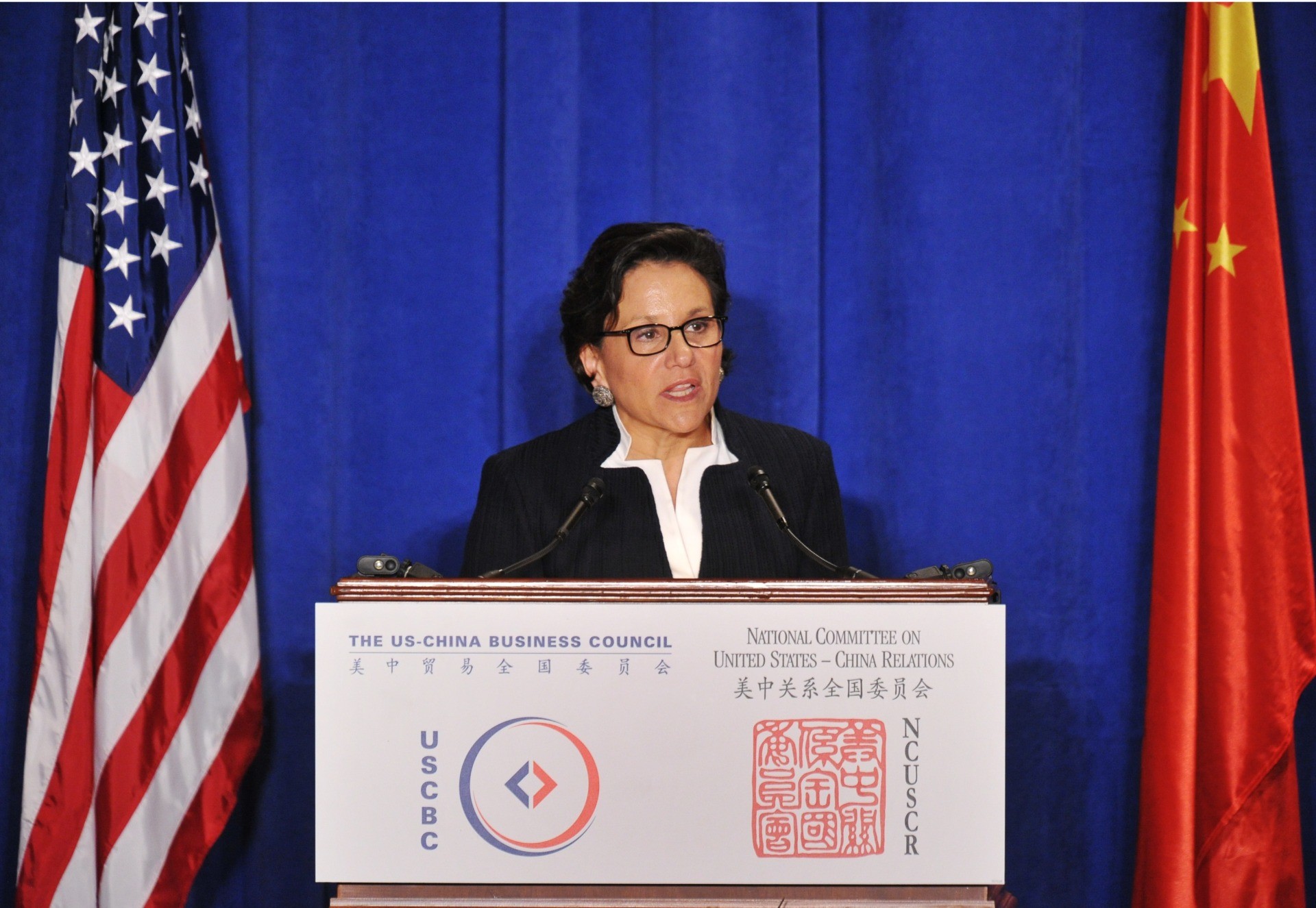
U.S. Commerce Secretary Penny Pritzker speaks during a dinner hosted by the US-China Business Council (USCBC) and National Committee on US-China Relations (NCUSCR) on July 11, 2013, in Washington, DC. (MANDEL NGAN/AFP via Getty Images)
Before him, President Obama’s Commerce Secretary was Penny Pritzker. She is the heir to the Hyatt Hotel fortune, but also has extensive commercial ties of her own to the Chinese, as the report also details.
The report provides support for the concept of “elite capture” – the explicit strategy on the part of the foreign countries like China to forge connections to the levers of power in various U.S. institutions to ensure favorable treatment.
Peter Schweizer is the president of the Government Accountability Institute, a senior contributor to Breitbart News, and the bestselling author of Red-Handed: How American Elites Get Rich Helping China Win.
No comments:
Post a Comment